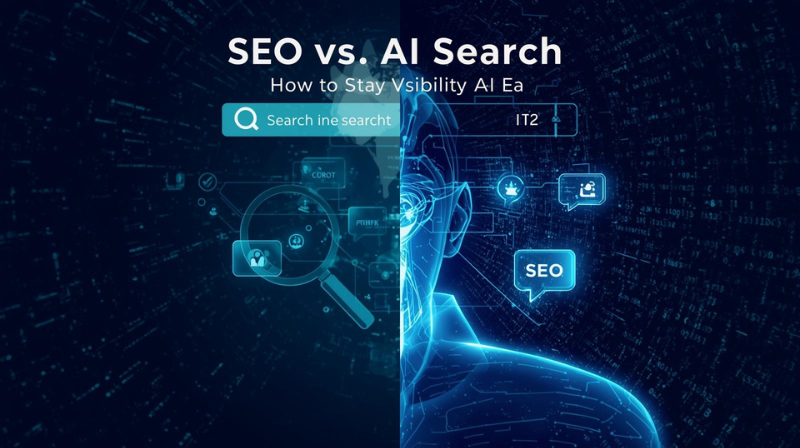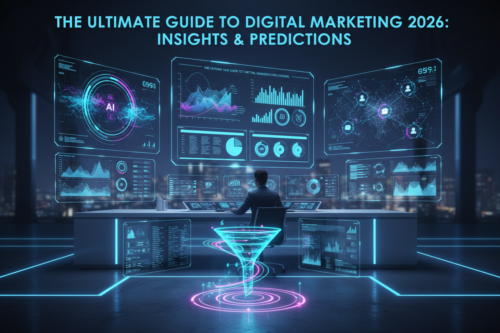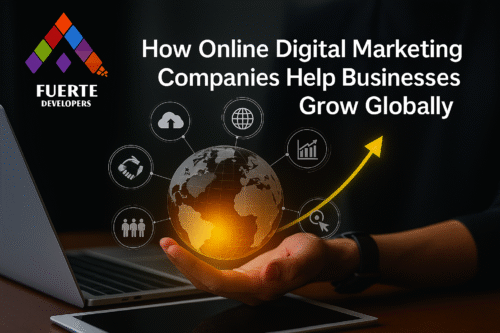The digital landscape is undergoing one of its most transformative phases yet. With AI-powered search engines reshaping how people discover information, businesses are asking one crucial question: Will SEO survive in the AI era? The answer is yes—but only if we evolve. In this article, we explore how SEO and AI search intersect, the shifts already taking place, and the strategies your business must adopt to remain highly visible.
The Rise of AI in Search
Artificial Intelligence has already become deeply integrated into search engines. Platforms like Google’s Search Generative Experience (SGE), Microsoft Bing with GPT, and AI-driven chatbots have changed how results are displayed. Instead of showing a list of ten blue links, AI often summarizes the most relevant content, giving users direct answers.
This shift impacts traditional SEO. Ranking on the first page is no longer enough—visibility now means being featured in AI-generated summaries, snippets, and conversational search results.
SEO vs. AI Search: What Has Changed?
- User Behavior
AI search tools reduce the number of clicks by providing instant answers. People rely on summarized content, meaning websites must compete harder for attention. - Ranking Factors
While backlinks, keywords, and on-page optimization remain important, content authority, topical depth, and user intent alignment carry more weight in AI search models.
Content Discovery
AI doesn’t just pull from the top results—it scans the entire web, identifying patterns of trust, authority, and expertise. Content that lacks depth or credibility risks being ignored entirely.
Why Traditional SEO Still Matters
Despite AI’s dominance, SEO is not dead. It is evolving. Search engines still rely on structured signals such as:
- Keyword optimization for context and relevance
- Backlinks and authority signals to verify trustworthiness
- Technical SEO for crawlability and indexing
- User experience metrics like Core Web Vitals, site speed, and mobile performance
Without these foundations, even the most insightful content risks being invisible.
How to Optimize for AI-Powered Search
To thrive in the AI-driven search era, businesses must expand beyond traditional tactics and align content strategies with AI models.
1. Create Authoritative, Human-Centric Content
AI favors content that demonstrates expertise, authority, and trustworthiness (E-E-A-T). This means publishing in-depth, well-researched articles backed by credible sources and first-hand expertise.
2. Focus on Conversational and Long-Tail Queries
AI tools excel at answering natural language queries. By incorporating long-tail keywords, question-based headings, and FAQ sections, you increase your chances of being selected for AI-generated answers.
3. Build Structured Data and Schema Markup
Schema markup helps search engines and AI systems understand your content better. By implementing structured data, your content can appear in rich results, knowledge panels, and AI summaries.
4. Prioritize Freshness and Topical Authority
AI-driven engines reward content that is current and consistently updated. Establishing topical authority through regular publishing on a niche subject boosts trust signals for AI algorithms.
5. Optimize for Voice and Multimodal Search
With AI assistants powering voice queries and visual search, optimizing for spoken keywords, local intent, and image SEO ensures you remain visible across multiple channels.
The Future of SEO in the AI Era
Looking forward, the relationship between SEO and AI search will be collaborative, not competitive. AI won’t replace SEO—it will redefine it. Businesses must:
- Embrace AI tools for content research, keyword clustering, and predictive analytics.
- Enhance brand credibility, ensuring AI recognizes them as a trusted authority.
- Invest in interactive content such as videos, infographics, and podcasts that AI can surface in responses.
- Monitor search intent shifts as AI search becomes more personalized.
Case Study: Brands Winning with AI Search Optimization
Some forward-thinking companies are already seeing success:
- E-commerce brands integrating AI-powered product descriptions with schema markup are being highlighted in Google’s shopping results.
- Healthcare providers publishing long-form, medically reviewed content dominate AI-powered health query summaries.
- Local businesses leveraging Google Business Profiles with AI-friendly data fields gain visibility in AI-assisted local search recommendations.
These examples highlight the importance of adaptability and proactive optimization.
Action Plan to Stay Visible in AI Search
To remain relevant in the AI era, businesses should immediately:
- Audit current SEO practices for AI-readiness.
- Expand keyword research to include conversational phrases.
- Enhance authority by producing long-form, data-backed, and expert-driven content.
- Adopt structured data for all content types.
Leverage AI tools for content creation, optimization, and predictive insights
Conclusion: SEO and AI Search Can Coexist
The rise of AI-powered search is not the end of SEO—it is the beginning of its most advanced era yet. Businesses that adapt by producing authoritative, structured, and intent-driven content will not only survive but thrive. The real winners will be those who see AI not as a threat, but as an opportunity to refine their visibility strategies.
Follow Us | Our Services | Contact Us | Linkedin | Instagram







